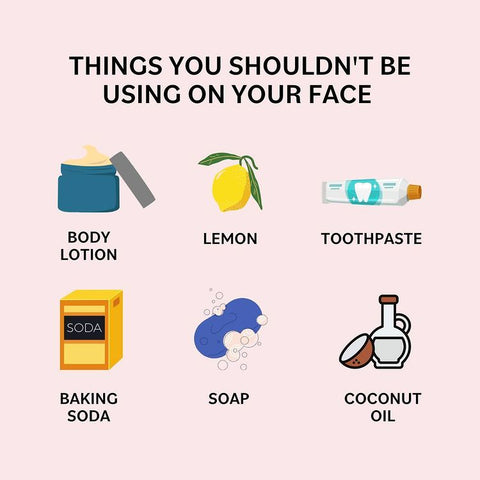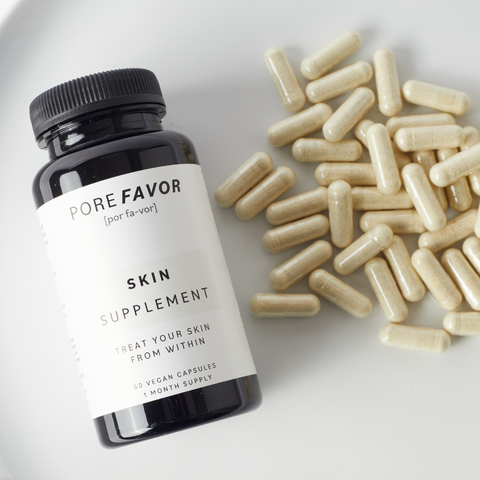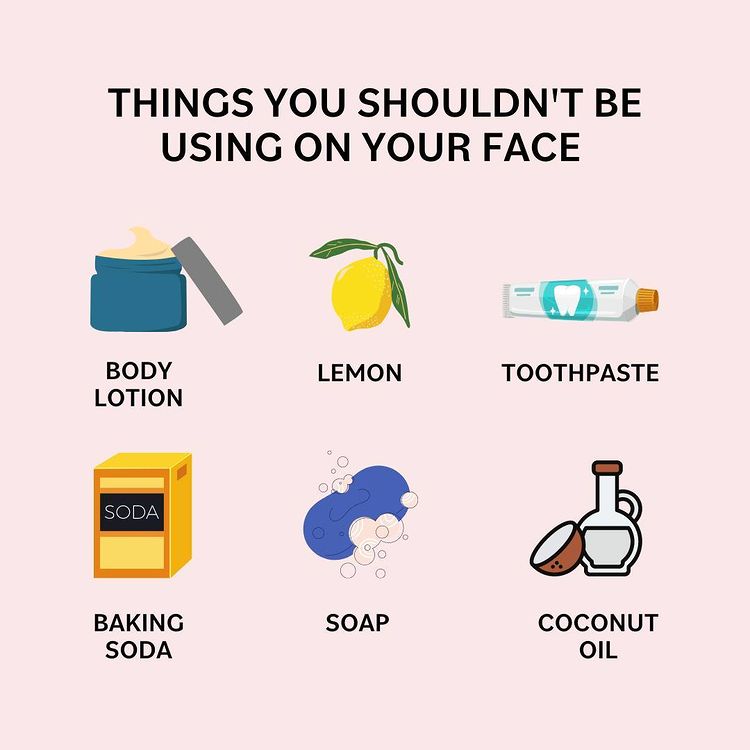Toothpaste? For those that have suffered with acne, this won’t be the first time you have heard the suggestion that toothpaste helps with acne. Growing up in the 90’s toothpaste was all the rage for acne treatment... but that's where it should have stayed, right? We will go more into the deal on toothpaste with acne below, but in researching for this paper we found a lot of very unusual, and not very helpful suggestions for what you can use to cure acne and help remove spots. We have reviewed the most common home remedy hacks for treating acne below. We'd love to hear the crazy recommendations people have made to you. Message us them on skincare@porefavor.com and we will send you a cheeky discount on our very own, science backed, acne supplements.
Can toothpaste help acne?
The common claim that toothpaste can fight acne is based on the ingredients baking soda or triclosan as cures for skin outbreaks and pimples. Immediately, we’re not quite sure why, if this claim was true, these blogs wouldn’t just recommend baking soda by itself! On top of that, triclosan is no longer used in most toothpastes! These blogs don't stop there, here is what else they claim;
- Some chemicals found in toothpaste kill the bacteria that cause or worsen acne breakouts.
- Ingredients such as alcohol, baking soda, or hydrogen peroxide may dry out the zit reducing it in size
The problem with these unfounded claims is that toothpaste is full other ingredients that are far too strong for the skin to cope with. Fluoride, artificial colouring and whitening agents can result in damage or burns to the surface of the skin. This really isn't great as acne scaring becomes worse when the skin is irritated (more on acne scaring here) So do you really want to cause damage to your skin for short term, unfounded benefits? There are better ways to treat the symptoms of acne and dry up those zits with face washes that contain AHA and BHAs, whilst if you want to prevent them from coming back you will need to treat the internal causes of acne. Check out our article here by Dr Anna H Chacon

So what's the deal on toothpaste with acne? Here's the short version. Toothpaste contains, or used to contain ingredients that helped dry up acne. Some of those ingredients are no longer used. And the wider ingredients can cause irritation, skin burns, which means long term more breakouts and more scaring. The best use of toothpaste is on those pearly whites.
So what about Baking soda for acne?
That’s also a no-go. Whilst it’s far less harmful than toothpaste and is often recommended by some DIY acne treatment blogs. Why? Because baking soda does have some anti-inflammatory, anti-septic properties that can sooth the skin.
However, studies demonstrate significant risks including:
- Causing blocked pores
- Damage to skin when it comes into contact with water and experiences a micro reaction
- Early onset of wrinkles
- skin irritation
- and worsened bouts of acne
So will baking soda help with acne? Maybe in the short term. But long term you are opening up your skin to more breakouts.
Can Salicylic acid in Aspirin help treat acne?
People claim that adding aspirin to your face can help remove and clear away acne. We think it’s better for headaches! Touted as a cure thanks to its salicylic acid (check out our article on salicylic acid and other AHAs and BHAs and how they can help your skin here) there have been no findings that can prove aspirin provides enough salicylic acid to act as a cure, and aspirins other ingredients can easily disrupt and block pores and hair follicles. If you do find yourself reaching for your pestle and mortar to create your own aspirin concoctions for your acne, you might be interested to know that there is an easier way to get these acne fighting salicylic acids in AHA facewashes (which has exactly the right level of the perfect salicylic acid concentrations.)
Can potato help acne?
Apparently someone said potato can fight acne on TikTok and know we are forced to write about it... this ‘hack’ is even sillier once you see it in person! A viral tiktok claimed that cutting up potato and sellotaping them to your face over your spots and pimples can get rid of spots. This skincare hack does contain some elements of knowledge, as the claim is based around the fact that potato has salicylic acid in it (which, as we know, is fantastic for clearing acne symptoms which is why we put it in our AHA facewash). But the potato has such tiny concentrations of salicylic acid that it cannot help acne, and so much starch which is much more capable of blocking up pores that using potato has just the opposite effect as these claims! Beside the idea that sticking them to your skin can help, potatoes are naturally high in vitamin c and antioxidants, which are incredible for your skin. But can you absorb sufficient levels from a potato to impact your acne? Unfortunately not. You can only get them by using a high vitamin C concentration facemask or serum. Potatoes are great sources of a lot of good vitamins that the body needs, but you can only get these by eating them (not that we needed an excuse to eat more!). So can potatoes fight acne? You might not be surprised at the answer: no. Potatoes are best served mashed, fried, roasted, or baked...not cellotaped to your face
Can apple cider vinegar clear acne?
Don't do it! Claims that apple cider vinegar contains all the organic acids needed to ‘kill acne-causing bacteria’ are a little far-fetched. Not only is there no guarantee of killing any bacteria, or evidence to back it, this also isn’t the reason most people are experiencing acne. That comes from sebum - and we have a great explanation article on that here.
But the main reason why experts say Apple cider vinegar should not be used to treat acne, is that it can be especially harmful if not diluted properly and can cause rashes and physical damage to the skin.
Sea Salt Spray & acne. Is there a connection?
This one is a little hard to follow. It’s claimed that the pH balance of salt water can balance your skin and kill bacteria. Whilst salt water can kill bacteria, the amount of salt water needed would be incredibly high to have any effect on your skins pH balance or for it to kill any microorganism. What makes this so bizarre though is that your body itself makes its own salt water in the form of sweat! If it was true that saltwater could naturally cure acne, then we’d finally have a really good reason to get us going to the gym! Unfortunately, instead, salt water in spray concentrations can not really do anything to help your skin - for refreshment we’d recommend spritzing yourself with plain old tap water on a summer's day! For acne treatment we recommend tackling the root cause (which we will discuss below).
So are there any home remedies to treat acne?
Suffering from acne growing up we tried so many hacks, tips and different topical solutions to absolutely no success, and this is why we founded POREFAVOR. Harsh doctor prescribed treatments that often don't tackle the root cause and home remedies that only make acne worse and irritate the skin led us to find a better way in our all natural, backed by science acne supplement that tackles the root cause of acne. This means rather than treating the symptoms, (i.e. the pimples) and having acne keep coming back, we target and resolve your hormones which are the real acne causes.
So is there a place for surface level topical treatments for acne and therefore home remedies? Absolutely - topical treatments can help reduce the symptoms of acne. But uncontrolled, home remedies that are largely highly acidic compounds often unnaturally dry out, irritate, and can cause future breakouts are to be avoided. We recommend using the best products designed and proven to help your skin.
Before we move onto how to treat your acne at home, its worth mentioning just a few more:

Coconut Oil - This will only clog your pores and lead to breakouts and acne.
Lemon - When life gives you lemons, of course, make lemonade! What you shouldn't be doing is rubbing slices of lemon on your face... Lemons contain a chemical called psoralen, which can make your skin sensitive to light. If you go out after applying lemon juice on your face it can cause irritation or even burn your skin.
What do I need to treat acne?

The interesting thing to see with all of these ‘hacks’ is that they all treat the surface of your skin. The only true hacks that work are those that you consume! Advice to eat large quantities of vitamin c, kale and leafy vegetables or coconut are right - the only problem comes from how difficult it is to consume that amount every single day. So why not make it much easier? (more on how much your diet would need to change here)The PORE FAVOR acne supplements gives the same ingredients as eating:
- 7 heads of broccoli (I3C)
- 5 tbsp of black pepper (Black pepper extract)
- 4 carrots (Vitamin A)
- 1 orange (Vitamin C)
- 35g of sunflower seeds (Vitamin E)
- 30 cups of mushrooms (Vitamin B5)
- A handful of brazil nuts (selenium)
- 8 tins of baked beans (Zinc)
- 5 cups of brown rice (Selenium)
- 2 coconuts
All of these super-powered ingredients in one easy-to-consume capsule.
You can find out the benefit of these here: Does diet make my breakouts worse? – PORE FAVOR USA
So no. topical skincare hack really works that well, and can often damage skin. The only real hack? Our superpowered capsules! Buy here


